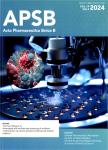Gli1 promotes epithelial-mesenchymal transition and metastasis of non-small cell lung carcinoma by regulating snail transcriptional activity and stability
Gli1 promotes epithelial-mesenchymal transition and metastasis of non-small cell lung carcinoma by regulating snail transcriptional activity and stability作者机构:Guangzhou Municipal and Guangdong Provincial Key Laboratory of Molecular Target&Clinical Pharmacologythe NMPA and State Key Laboratory of Respiratory DiseaseSchool of Pharmaceutical Sciences and the Fifth Affiliated HospitalGuangzhou Medical UniversityGuangzhou 511436China Department of Respiratory and Critical Care Medicinethe Sixth Affiliated Hospital of Guangzhou Medical UniversityQingyuan People’s HospitalQingyuan 511518China GMU-GIBH Joint School of Life SciencesGuangzhou Medical UniversityGuangzhou 511436China
出 版 物:《Acta Pharmaceutica Sinica B》 (药学学报(英文版))
年 卷 期:2022年第12卷第10期
页 面:3877-3890页
核心收录:
学科分类:1007[医学-药学(可授医学、理学学位)] 1002[医学-临床医学] 100214[医学-肿瘤学] 10[医学]
基 金:supported by National Natural Science Foundation of China(82104201) the GuangDong Basic and Applied Basic Research Foundation(2019A1515110058,China) the Science and Technology Program of Guangzhou(202002030026,China) the open research funds from the Sixth Affiliated Hospital of Guangzhou Medical University,Qingyuan People’s Hospital(202011-306,China)to Xueping Lei,National Natural Science Foundation of China(81903607)to Songpei Li,Research Program of Guangzhou Education Bureau(202032845,China) the Science and Technology Program of Guangzhou(202102020017,China)to Qiudi Deng.
主 题:Non-small cell lung carcinoma Metastasis Epithelialemesenchymal transition Glioma-associated oncogene 1 Promote Snail Protein stability GANT-61
摘 要:Metastasis is crucial for the mortality of non-small cell lung carcinoma(NSCLC) patients.The epithelial-mesenchymal transition(EMT) plays a critical role in regulating tumor metastasis.Glioma-associated oncogene 1(Gli1) is aberrantly active in a series of tumor tissues. However, the molecular regulatory relationships between Gli1 and NSCLC metastasis have not yet been identified. Herein,we reported Gli1 promoted NSCLC metastasis. High Gli1 expression was associated with poor survival of NSCLC patients. Ectopic expression of Gli1 in low metastatic A549 and NCI-H460 cells enhanced their migration, invasion abilities and facilitated EMT process, whereas knock-down of Gli1 in high metastatic NCI-H1299 and NCI-H1703 cells showed an opposite effect. Notably, Gli1 overexpression accelerated the lung and liver metastasis of NSCLC in the intravenously injected metastasis model. Further research showed that Gli1 positively regulated Snail expression by binding to its promoter and enhancing its protein stability, thereby facilitating the migration, invasion and EMT of NSCLC. In addition, administration of GANT-61, a Gli1 inhibitor, obviously suppressed the metastasis of NSCLC. Collectively, our study reveals that Gli1 is a critical regulator for NSCLC metastasis and suggests that targeting Gli1 is a prospective therapy strategy for metastatic NSCLC.



